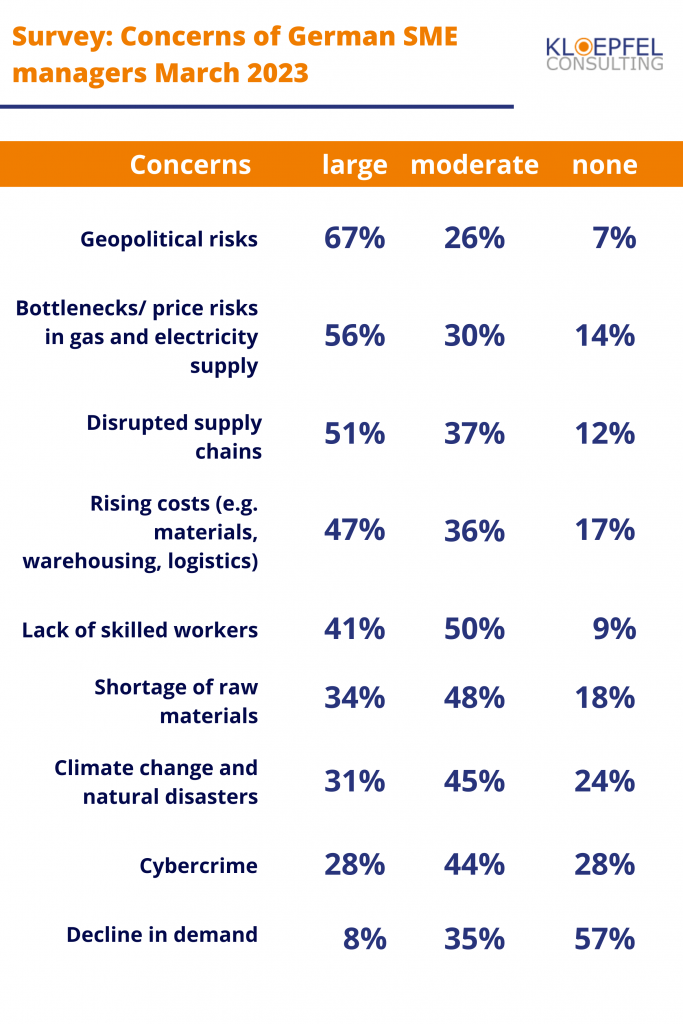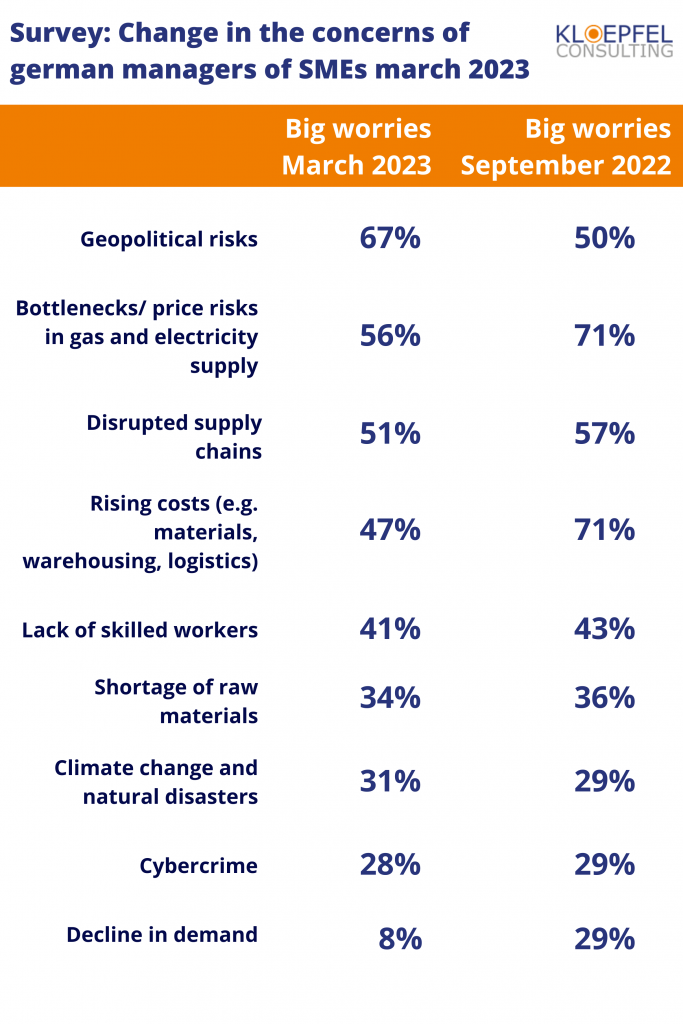Geopolitical concerns take first place
- Concern about geopolitical risks displaces concern about rising costs from first place
- Decline in demand hardly an issue
- 38 percent dependent on inputs from China
The concerns of German specialists and managers of medium-sized companies with annual sales of up to 500 million euros have shifted over the past seven months. This was determined by Kloepfel Consulting, a management consultancy specializing in supply chains, in a recent online survey of 186 specialists and managers. The random survey was conducted across all industries. The previous survey took place in September 2022.
Participants were asked on which topic they were very concerned, moderately concerned and not concerned. This text has a focus on the major concerns. Chart 1 also shows, in percentages, responses on moderate worries and where respondents are not worried.
Worries about geopolitical risks the greatest
In March 2023, concerns about geopolitical risks (67 percent) displaced concerns about rising costs (47 percent) from first to fourth place. Previously, 50 percent of participants were concerned about geopolitical risks.
Last September, 71 percent feared rising costs. Currently, the figure has dropped to 47 percent.
Efe Duran Sarikaya, managing director of Kloepfel Consulting, says, “Even though prices are softening, there are big profits hidden in manufacturing products. Technicians, buyers and supply chain managers often know this, but they lack the capacity to implement it. One major lever here is cost engineering, for example to use materials more efficiently or to optimize production processes. Another lever is technical sourcing to source suppliers with the optimal manufacturing processes for a part.”
High electricity prices remain a concern
While it was still unclear in September whether power outages could occur in winter, the supply of electricity remained secure. However, more than one in two respondents (56 percent) are concerned about high electricity prices. In the previous survey, the figure was still 71 percent.
Supply chains and raw material shortages remain problematic
51 percent are concerned about disrupted supply chains. However, this is six percentage points less than in September 2022. 34 percent of participants were concerned about raw material shortages. Last September, the figure was 36 percent.
Marc Kloepfel, CEO Kloepfel Group, explains: “It is true that many companies have filled their warehouses to ease the situation. However, especially in manufacturing industries such as mechanical and plant engineering or the automotive sector, there is great concern about supply bottlenecks due to disrupted supply chains and raw material shortages. Companies have already done a lot to get supply risks under control. Nevertheless, the identification of hidden risks – also in view of the Supply Chain Act – must be driven forward along the supply chain through digitalization.”
Concerns about skills shortages, natural disasters, and cyber attacks virtually unchanged
41 percent (previously 43 percent) of the managers surveyed are very concerned about a lack of skilled workers. Concerns about natural disasters are also almost unchanged. They stood at 31 percent in March and 29 percent in September. Fears of cyber attacks have also remained at the same high level. Currently, they are at 28 percent; before that, they were at 29 percent.
Concerns about a drop in demand significantly reduced
Fortunately, concerns about a drop in demand have decreased significantly. Only eight percent said they were very worried (previously 29 percent). Moderate worries about weakening demand are currently held by 35 percent – previously it was 50 percent.
Dependencies on China
The survey was supplemented by the question of dependence on China. 62 percent of managers said this did not affect them. Of the remaining respondents who purchase Chinese inputs, 16 percent say they have been able to become completely independent. 47 percent have been able to do so partially and 37 percent barely.
Represented industries
21 percent of the participants come from the machinery and plant engineering and automotive sectors. The chemical sector was involved with ten percent. IT companies and the retail sector were each represented with seven percent. Consumer goods food and service providers each accounted for six percent. Consumer Goods Non-Food, the high-tech companies and the construction sector each accounted for five percent. The health care sector accounted for four percent and the pharmaceutical industry for three percent. Other industries accounted for the remaining 21 percent.
The survey was conducted from March 02 to March 15, 2023.
Contact:
Kloepfel Group
Christopher Willson
Pempelforter Str. 50 | 40211 Duesseldorf
Tel.: 0211 941 984 33 | Mail: rendite@kloepfel-consulting.com




